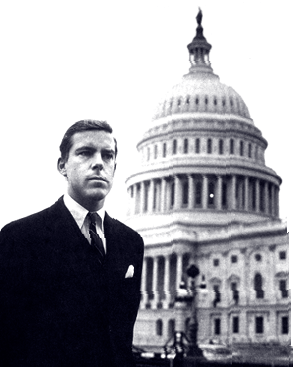
Worth Bingham Prize
The Worth Bingham Prize, also referred to as the Worth Bingham Prize for Investigative Reporting, is an annual journalism award which honors: "newspaper or magazine investigative reporting of stories of national significance where the public interest is being ill-served."[2][3]
Worth Bingham Prize
"The Worth Bingham Prize honors newspaper or magazine investigative reporting of stories of national significance where the public interest is being ill-served."[2]
1967
About the prize[edit]
The prize is named for Robert W. "Worth" Bingham, a newspaper heir and reporter who died at the age of thirty-four.[4][5] Bingham graduated from Harvard College in 1954[6] and served as an officer in the United States Navy. He joined the staff of the Louisville Courier-Journal and Times in 1961, where he received a National Headliner Award for his series on "Our Costly Congress." Before he died in 1966 in an accident on Nantucket Island, he was assistant to the publisher.[5]
The prize is seen as a recognition of the best investigative reporting in American newspapers and newsmagazines.[7][8] The investigative reporting recognized tends to involve violations of the law, inefficiencies in government; or conflicts of interest and questions of impropriety. The three-judge panel of the Worth Bingham Prize considers the impediments the journalist faced during his or her research, their style of writing, and the impact their piece has had on the public.[2][9] Currently, the Worth Bingham Prize judges include representatives from the Radio-Television News Directors Association, Copley News Service, The New York Times, and Bloomberg News.[10] The prize itself is funded through the tax-exempt Worth Bingham Memorial Fund, which is headquartered in Washington, D.C.[2][11] In order to be eligible for the prize, journalists may submit a single piece, a related number of articles, or three unrelated stories. Columns and editorial pieces are also eligible for the prize.[12] The winner is presented with a trophy and US$10,000, at the Annual Awards Dinner of the National Press Foundation.[13][14]
The first award was given in 1967 to William Lambert of LIFE magazine.[2] Notable recipients include Seymour Hersh of Dispatch News Service in 1969, for uncovering the My Lai massacre during The Vietnam War; and Bob Woodward and Carl Bernstein in 1972, for their reports on the Watergate scandal involving Richard Nixon. Woodward won the award a second time in 1987, for his reporting on secrecy and covert action in United States foreign policy.[15][16]